This is an old revision of this page, as edited by Arjayay (talk | contribs) at 12:00, 21 April 2024 (→Tourist centers in Ogun state: Rm addition without an article or a ref). The present address (URL) is a permanent link to this revision, which may differ significantly from the current revision.
Revision as of 12:00, 21 April 2024 by Arjayay (talk | contribs) (→Tourist centers in Ogun state: Rm addition without an article or a ref)(diff) ← Previous revision | Latest revision (diff) | Newer revision → (diff) State of Nigeria State in Nigeria| Ogun State Ìpínlẹ̀ Ògùn (Yoruba) | |
|---|---|
| State | |
 Aerial view of Gbagura mosque in Abeokuta in Ogun State Aerial view of Gbagura mosque in Abeokuta in Ogun State | |
 Flag Flag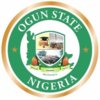 Seal Seal | |
| Nicknames: Gateway State | |
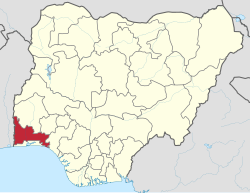 Location of Ogun State in Nigeria Location of Ogun State in Nigeria | |
| Coordinates: 7°00′N 3°35′E / 7.000°N 3.583°E / 7.000; 3.583 | |
| Country | |
| Date created | 3 February 1976 |
| Capital | Abeokuta |
| Government | |
| • Body | Government of Ogun State |
| • Governor | Dapo Abiodun (APC) |
| • Deputy Governor | Noimot Salako-Oyedele (APC) |
| • Legislature | Ogun State House of Assembly |
| • Senators | C: Shuaibu Salisu (APC) E: Gbenga Daniel (APC) W: Solomon Adeola (APC) |
| • Representatives | List |
| Area | |
| • Total | 16,980.55 km (6,556.23 sq mi) |
| • Rank | 24th of 36 |
| Population | |
| • Total | 3,751,140 |
| • Estimate | 6,379,500 |
| • Rank | 11 of 36 |
| • Density | 220/km (570/sq mi) |
| Demonym | Ogun |
| GDP (PPP) | |
| • Year | 2021 |
| • Total | $32.55 billion 8th of 36 |
| • Per capita | $5,288 11th of 36 |
| Time zone | UTC+01 (WAT) |
| postal code | 110001 |
| ISO 3166 code | NG-OG |
| HDI (2021) | 0.671 medium · 2nd of 37 |
Ogun State is a state in southwestern Nigeria. As a Nigerian state, Ogun is the second most industrialised state after Lagos, with a focus on metal processing. It has good road and rail connections to the harbours in Lagos and Lekki. Wole Soyinka, winner of the Nobel Prize for Literature 1986, lives in Ogun.
Abeokuta is both Ogun State's capital and most populous city; other important cities in the state include Ijebu-Ode, the capital of the Ijebu Kingdom, and Sagamu, Nigeria's leading kola nut grower. Ogun state is covered predominantly by rain forest and has wooden savanna in the northwest. Ogun State had a total population of 3,751,140 residents as of 2006, making Ogun State the 16th most populated state in Nigeria. In terms of landmass, Ogun State is the 24th largest State in Nigeria with land area of 16,762 kilometer square.
Ogun State is predominantly Yoruba, with the Yoruba language serving as the lingua franca of the state. The dominant religions in Ogun State are Islam and Christianity although a certain amount of traditional religion is still practiced. Ogun State is noted for being the almost exclusive site of Ofada rice production. Ogun is also home to many icons in Nigeria in particular and Africa in general.
Governor
The current governor is Prince Dapo Abiodun, A member of the All Progressives Congress, who heads the Executive Council of Ogun State. On Wednesday May 29, 2019, Abiodun was sworn in as the fifth governor of Ogun State at the MKO Abiola Stadium in Kuto, Abeokuta. He was re-elected for a second term of office in March 2023.
Local government areas
See also: List of Ogun State local government areas by areaPolitics
The State government is led by a democratically elected governor who works closely with members of the state's house of assembly. The capital city of the state is Abeokuta.
Geography
Ogun State borders the Republic of Benin to the west for about 185 km, Oyo State and Osun State (for 84 km) to the north, Ondo State to the east, Lagos State to the south for about 283 km, and has 16 km of coastline on the Bight of Benin to the south, interrupted by Araromi Beach exclave of Ondo State.
Climate
Ogun has a Tropical wet and dry or savanna climate. The city's yearly temperature is 29.34 °C (84.81 °F) and it is -0.12% lower than Nigeria's averages. Ogun typically receives about 141.58 millimeters (5.57 inches) of precipitation and has 224.18 rainy days (61.42% of the time) annually.
Major rivers
Electoral system
The governor of the state is selected using a modified two-round system. To be elected in the first round, a candidate must receive the plurality of the vote and over 25% of the vote in at least two -third of the State local government Areas. If no candidate passes threshold, a second round will be held between the top candidate and the next candidate to have received a plurality of votes in the highest number of local government Areas.
See also: List of villages in Ogun StateOgun State consists of twenty local government areas. They are:
- Abeokuta North Akọmọjẹ
- Abeokuta South Ake
- Ado-Odo/Ota Ọ̀tà
- Ewekoro Itori
- Ifo Ifo
- Ijebu East Ọ̀gbẹ̀rẹ̀
- Ijebu North Ìjẹ̀bú Igbó
- Ijebu North East Atan
- Ijebu Ode Ìjẹ̀bú-Òde
- Ikenne Ìkẹ́nnẹ́
- Imeko Afon Imẹkọ
- Ipokia Ipokia
- Obafemi Owode Owódé-Ẹ̀gbá
- Odogbolu Odògbólú
- Odeda Odẹda
- Ogun Waterside Abigi
- Remo North Ìṣarà-Rẹ́mọ
- Sagamu
(Shagamu) Ṣàgámù - Yewa North
(formerly Egbado North) Ayetoro - Yewa South
(formerly Egbado South) Ilaro
The main ethnic groups in Ogun State are the Ẹgba, Ijebu, Remo, Egbado, Awori and the Egun peoples.There are also sub groups like the Ikale, the Ketu, the Ohori and the Anago
Ogun State is divided into three senatorial districts: Ogun Central, Ogun East and Ogun West.
Ogun Central consists mostly of the Egbas that occupies six local governments: Abeokuta North (Akomoje), Abeokuta south (Ake), Ewekoro (Itori), Ifo (Ifo), Obafemi owode (Owode ẹgba) and Odeda (Odeda).
Ogun East consists mostly of the Ijebus and the Remos that occupies 9 local governments: Ijebu East (Ogbẹrẹ), Ijebu North (Ijebu Igbo), Ijebu North East (Attan), Ijebu ode (Ijebu ode), Ikenne (Ikenne remo), Odogbolu (Odogbolu), Ogun waterside (Abigi), Remo North (Ilisan Remo) and Sagamu (Sagamu).
Ogun West consists mostly of the Yewas (formerly Egbados) that occupies 5 local governments: Ado odo Ota (Otta), Imeko Afon (Imeko), Ipokia (Ipokia), Yewa North (Ayetoro) and Yewa South (Ilaro).
History
In pre-colonial times, today's Ogun belonged to the kingdom of Oyo, which sank into civil war around 1800. South of Ogun, on the tiny island of Lagos, the British had a naval base near which the town of the same name grew rapidly.
Until the Berlin Congo Conference in 1885, Great Britain had focussed on a few strategically placed bases for its merchant fleet and navy, such as Lagos and Calabar, and was not interested in the communities developing there.
After the European colonial powers had staked out their spheres of interest 1885 in Berlin (these were only valid if another power had not previously brought the area in question under its control) the United Kingdom quickly expanded thusly its territory in the assigned Niger region. The British attack on the Kingdom of Oyo in 1891 was the first step, the punitive expedition against Benin 1896 the second. Today's Ogun became part of the "Protectorate of Lagos" (as opposed to the Colony of Lagos; the border between these two is identical to the modern border between Lagos State and Ogun State - inhabitants of a colony were treated as fully entitled subjects of the British crown, those in protectorates not) in 1893 and later of the "Protectorate of Yorubaland", in 1906 of the "Protectorate of Southern Nigeria" and in 1914 of the whole of Nigeria. In 1899, it received a railway connection to Lagos, the "Boat Express" ran through Ogun to Apapa and thus connected the region with the wider world. In 1899, it was several years earlier in this than other regions in West and Central Africa that were not connected to the coast.
In the 1930s, Ogun was a centre of the Nigerian women's movement under the leadership of Funmilayo Ransome-Kuti (Fela Kuti's mother). Democracy in colonial Nigeria after 1922 only existed in Lagos and Calabar; Nigerians could not participate politically elsewhere (see here).
During the 1940s, food was strictly rationed in Nigeria. The transport of food from the more agrarian Ogun to the hungry metropolis of Lagos was severely penalised (Pullen Scheme, see here).
In the first elections in Ogun, 1954, the semi-socialist "Action Group" (AG) under Ọbáfẹ́mi Awólọ́wọ̀ became the strongest party in the Western Region, to which Ogun also belonged.
After independence in 1960, the Yoruba region, and Ogun in particular, was engulfed in conflict between the Ọbáfẹ́mi Awólọ́wọ̀ and Samuel Ládòkè Akíntọ́lá fractions of the AG party ("Operation Wetie", see here). In July 1966, the then ruler of Nigeria, Johnson Agulyi-Ironsi, was assassinated in Abeokuta in the second coup of the year, which was the prelude to the Biafra War.
The state was formed on 3 February 1976 from part of the former "Western" state.
Educational facilities
Ogun state has three federal secondary schools; Federal Government Girls' College, Sagamu and Federal Government College, Odogbolu and Federal Science and Technical College, Ijebu-Imushin.
Ogun state has one Federal University; the Federal University of Agriculture, Abeokuta (FUNAAB) and one Federal college of education, FCE Osiele (both at Odeda Local government area), one state government college of education, named after the late Nigerian educationist of international repute Augustus Taiwo Solarin in 1994 as Tai Solarin College of Education (TASCE), (formerly known as Ogun State College of Education, Ijagun, Ijebu-Ode, one Federal Polytechnic, Ilaro). One is named after late Nigerian business mogul and winner of June 12, 1993 election, Basorun Moshood Kasimawo Olawale Abiola as Moshood Abiola Polytechnic (MAPOLY), formerly known as Ogun State Polytechnic, Ojere, Abeokuta, Another Gateway Polytechnic Saapade, Remo (GAPOSA), Abraham Adesanya Polytechnic Ijebu-Igbo (Aapoly) (formerly known as 'The Polytechnic Ijebu-Igbo) it was name after Chief Abraham Aderibigbe Adesanya who was a Nigerian politician, lawyer and activist.
Two state government universities: Olabisi Onabanjo University, Ago Iwoye (formerly known as Ogun State University), and the Tai Solarin University of Education (TASUED) Ijebu Ode.
Ogun State has a total of nine registered universities, the highest of any state in Nigeria. It has five private universities. Amongst which are Chrisland University, Hallmark University in Ijebu-itele, Abeokuta Bells University of Technology in Ota, Covenant University and Babcock University in Ilisan-Remo, which was the first private university in the country.
The state has two major government hospitals: the Federal Medical Center at Abeokuta, and the Olabisi Onabanjo University Teaching Hospital in Sagamu. The National Youth Service Corps (NYSC) Permanent Orientation Camp is located at Sagamu Local Government area of the state.
Ogun state Government has begin the itele road today
Tertiary institutions
See also: List of tertiary institutions in Ogun State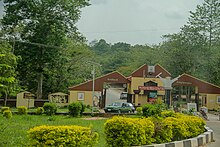
- Babcock University, Ilisan Remo
- Bells University of Technology, Ota
- Chrisland University, Abeokuta
- Christopher University, Lagos Ibadan ExpressWay Makun, Sagamu
- Covenant University, Ota
- Crawford University, Igbesa
- Crescent University, Abeokuta
- Federal Polytechnic, Ilaro
- Federal University of Agriculture, Abeokuta
- Hallmark University, Ijebu Itele
- McPherson University, Seriki-Sotayo
- Moshood Abiola Polytechnic, Ojere
- Mountain Top University, Lagos-Ibadan Expressway
- National Open University of Nigeria, Kobape, Abeokuta
- Ogun State College of Health Technology, Ilese, Ijebu Ode
- Olabisi Onabanjo University, Ago Iwoye
- Tai Solarin University of Education, Ijagun, Ijebu-Ode
Think tanks
Economy
The state is one of the richest and most developed areas in Nigeria and has one of the lowest incidences of extreme poverty (around 5% of the population against a national average of 31%) according to World Bank data from 2018.
Nicknamed the "Gateway to Nigeria", the state is notable for having a high concentration of industrial Estates and being a major manufacturing hub in Nigeria. Major factories in Ogun include the Dangote Cement factory in Ibese, Nestle, Lafarge Cement factory in Ewekoro, Memmcol in Orimerunmu, Coleman Cables in Sagamu and Arepo, Procter & Gamble in Agbara, amongst others.
Primary sector
Mining and agriculture are among the most important economic sectors in Ogun. Limestone, chalk, phosphate and gravel are mined and grain, rice, maize, cassava, yams, bananas, cocoa, kola nuts, rubber, palm oil and palm kernels are harvested. The state is the largest producer of kolanut in Nigeria.
Secondary sector, metal processing
Ogún is also the name of the god (Orisha) for metalworking in the local Yoruba nature religion, similar to the Greek Hephaestus or the Roman god Vulcan (since the ancient world had trade relations with present-day Nigeria, this may not be entirely coincidental). The state lives up to this name by being the Nigerian centre for metalworking. Here are two examples:
- Proforce manufactures armoured vehicles in Ode-Remo (25 km from Lagos), which are also sold to Europe. Since 2008, the company has expanded its product range and also produces drones for the security sector.
- The wagon assembly plant in Kajola is the only plant in West Africa that manufactures, maintains and repairs railway vehicles.
Ogun also produces timber, ceramic products, bicycle tyres, carpets, adhesives and other products.
Transportation
Ogun benefits from its proximity to the metropolis of Lagos and the new deep-sea harbour and the new Dangote refinery in Lekki (as of 2024). The planned airport Lagos-Epe will be located next to the border to the state of Ogun.
Railways
Nigerian Railway Company
Ogun benefits from the Lagos-Abeokuta-Ibadan standard rail link since 2021.
The planned Apapa-Kajola Express will connect the centre of the state with the Lagos port.
Abeokuta also is connected with Lagos by 77 km of the Western Railway (built in 1899), which still is used for freight trains.
Lagos Mass Transit (Lamata)
The terminus of the "Red Line" of the Lagos suburban railway is located in Agbado, which is part of the Lagos agglomeration but belongs to the state of Ogun in administrative terms. This is why the trains and carriages of Lagos State will be parked, cleaned and maintained in Ogun.
Roads
Federal Highways are:
- A1 north from Lagos as part of the African Unity Road TAH2 Trans-African Highway 2,
- E1 Lagos-Ibadan Expressway north to Oyo State,
- A5 north from Lagos via Abeokuta and east to Oyo State at Omin Adio,
- A121 east from A1 in Sagamu as the Benin-Sagamu Expressway via Ijebu-Ode to Ondo State at Kajola as part of the Trans-African 8 (TAH 8) Lagos-Mombasa Highway.
Three roads to the Republic of Benin:
- the Sango Ota-Idi-Iroko Rd at Idiroko as part of the Lagos-Badagry-Porto Novo highway west to RNIE 1,
- the Oja-Odan Road from Ilaro at Obelle to RN3 in Pobè,
- F102 west from Sagamu via Abeokuta to Meko at Idofa to RNIE 4 to Kétou.
Other major roads include:
- the Epe-Ijebu-Ode Rd south from Sagamu to Lagos State at Agboju,
- the Iken-Sekungba Rd south from the Awa-Itokin Rd from Egbe to Lagos State at Omu,
- the Agbara-Atan Rd south from Atan to Lagos State at Morogbo,
- the Abeokuta-Igboora-Iseyin Rd north from the Ayetoro Rd at Rounda Roundabout to Oyo State as the Ibara-Orile-Ijeun Rd,
- the Ibadan-Eruwa Rd west from A5 at Ilugun to Oyo State at Olokemeji,
- the Ibadan-Ijebu-Ode Rd north from Ilaporu to Oyo State at Mamu,
- the Ibadan-Ijebu-Igbo Rd northeast from Ilaporu to Oyo State at Olugbuyi.
Religion
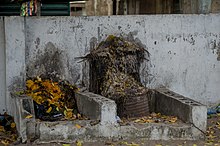
Mainly Islam and Christian, some traditional Yoruba animism.
The Anglican Province of Lagos within the Church of Nigeria includes the ten Dioceses of Awori led by Bishop Johnson Akin Atere (2009), Egba (1976) led by Bishop Emmanuel Adekunle (2009), Egba West (2007) led by Bishop Samuel Oludele Ogundeji (2010), Ifo (2007) led by Bishop Nathaniel Oladejo Ogundipe (2012), Ijebu led by Bishop Peter Rotimi Oludipe (2020), Ijebu-North led by Bishop Solomon Kuponu (2005), Remo led by Bishop Michael Fape (2004, Archbishop of Lagos 2016-21), Yewa, formerly Egbado led by Bishop Michael Adebayo Oluwarohunbi (2014), and Ijebu-South West led by Bishop Babatunde Ogunbanwo (2009).
179,014 Catholics (2020) in the Dioceses of Abeokuta (1997) with 60 parishes under Bishop Peter Kayode Odetoyinbo (2014) and Ijebu-Ode (1969) with 40 parishes under Bishop Francis Obafemi Adesina (2019), both suffragans of the Archdiocese of Lagos.
Notable religious places
- The Bilikisu Sungbo Shrine, Oke-Eiri, near Ijebu-Ode. It was declared a part of the national heritage in 1964, and is believed by the Ijebus to be the burial place of the fabled Queen of Sheba. It serves as a place of pilgrimage for Yoruba traditionalists, Yoruba Muslims and Yoruba Christians alike.
- The Church of the Lord (Aladura), Ogere Remo
- Redemption Camp (Lagos Ibadan Express Road)
- Living Faith Church Worldwide, (Canaanland, Km. 10, Idiroko Road, Ota, Ogun State, Nigeria)
Notable people
| This section does not cite any sources. Please help improve this section by adding citations to reliable sources. Unsourced material may be challenged and removed. (April 2017) (Learn how and when to remove this message) |
- Abraham Adesanya (1922–2008), politician
- Adebayo Adedeji (1930–2018), economist
- Adebayo Ogunlesi (b. 1953), lawyer, investment banker
- Adegboyega Dosunmu Amororo II, film producer, Olowu of Owu kingdom
- Adewale Oke Adekola
- Afolabi Olabimtan
- Anthony Joshua
- Babafemi Ogundipe
- Babatunde Osotimehin
- Bisi Onasanya
- Bola Ajibola
- Bola Kuforiji Olubi
- Bosun Tijani (b. 1977), Entrepreneur
- Olu Oyesanya
- Cornelius Taiwo
- Dapo Abiodun
- David Alaba, son of George Alaba, a prince of Ogere Remo
- Dimeji Bankole
- Ebenezer Obey, jùjú musician
- Ernest Shonekan
- Fela Kuti (1938–1997), multi-instrumentalist, bandleader, composer, political activist, Pan-Africanist
- Fireboy DML, singer
- Femi Okurounmu, politician
- Fola Adeola, businessman, politician
- Funmilayo Ransome-Kuti (1900–1978), educator, women's rights activist
- Funke Akindele (b. 1977), Actress
- Gbenga Daniel (b. 1956), politician
- Hannah Idowu Dideolu Awolowo (1915–2015), businesswoman and politician
- Hubert Ogunde (1916–1990), actor, playwright, theatre manager and musician
- Ibikunle Amosun (b. 1958), politician, senator, Governor of Ogun State in 2011–2019
- Idowu Sofola (1934–1982), jurist, President of the Nigerian Bar Association in 1980–1982
- Joseph Adenuga (b. 1982), aka Skepta, British musician and record producer
- Prof. Lateef Akinola Salako CON, professor emeritus of phamachology and therapeutics
- Jubril Martins-Kuye (b. 1942), politician
- K1 De Ultimate (b. 1957), Fuji musician
- Kehinde Sofola (1924–2007), jurist
- Kemi Adeosun (b. 1967), former Finance Minister of Nigeria
- Kunle Soname, Entrepreneur, Politician
- Laycon (b. 1993), professional name of Olamilekan Moshood Agbeleshe, reality TV personality, rapper, singer and songwriter
- Mike Adenuga
- Moshood Abiola
- Oba Otudeko (b. 1943), businessman
- Obafemi Awolowo (1909–1987)
- Ola Rotimi
- Olabisi Onabanjo
- Oladipo Diya
- Olamide
- Olawunmi Banjo
- Olusegun Obasanjo
- Olusegun Osoba
- Paul Adefarasin
- Peter Akinola
- Salawa Abeni
- Sara Forbes Bonetta
- Tai Solarin (1922–1994), educator, author, civil rights activist
- Thomas Adeoye Lambo (1923–2004), scholar, administrator, psychiatrist, Deputy Director General of the World Health Organization
- Tomi Favored, gospel artiste
- Tunde Bakare (b. 1954), Prophetic-Apostolic Pastor, politician
- Tunji Olurin (b. 1944), retired general
- Wole Soyinka (b. 1934), 1986 The Nobel Prize for Literature laureate
- Yemi Osinbajo (b. 1957), politician, lawyer
Tourist centers in Ogun state
Mineral resources in Ogun State
The following are the mineral resources in Ogun State:
References
- "Ogun State: Subdivision". www.citypopulation.de.
- ^ Okeowo, Gabriel; Fatoba, Iyanuoluwa, eds. (2022-10-13). "State of States 2022 Edition" (PDF). Budgit.org. BudgIT. Retrieved 2023-03-07.
- "Sub-national HDI - Area Database - Global Data Lab". hdi.globaldatalab.org. Retrieved 2018-09-13.
- "Ogun | state, Nigeria". Encyclopedia Britannica. Retrieved 2021-09-23.
- Aderoju, Michael Atilade (2015). "Impact of kolanuts trade on socio-economic development of Sagamu, 1910-1970". Nigerian Journal of Economic History. 13: 167–188.
- ^ "Ogun State". Ogun Smart City. Retrieved 2020-05-24.
- "National Results" (PDF). 2011-05-19. Archived from the original (PDF) on 19 May 2011. Retrieved 2021-12-10.
- "World Gazetteer: Nigeria - administrative divisions (per geographical..." archive.ph. 2013-01-05. Archived from the original on 2013-01-05. Retrieved 2021-12-10.
- "OGUN STATE". Ogun State Government Official Website. Retrieved 2021-03-07.
- Oludare, Ishola (2021-08-15). "Declare public holiday for Ifa festival like Muslims, Christians – Traditionalists tell Abiodun". Daily Post Nigeria. Retrieved 2021-12-08.
- "Executives". Ogun State Government Official Website. Archived from the original on 2020-09-22. Retrieved 2020-05-24.
- "Abiodun takes oath of office as Ogun. In 2023, he was re-elected for a second term of office. Gov". Punch Newspapers. 2019-05-29. Retrieved 2022-02-04.
- Oguntola, Tunde (2022-09-27). "2023: Next President, Govs Must Get Two-thirds Spread, Says INEC". Retrieved 2023-02-23.
- "Ogun, NG Climate Zone, Monthly Weather Averages and Historical Data". tcktcktck.org. Retrieved 2023-06-30.
- Oguntola, Tunde (2022-09-27). "2023: Next President, Govs Must Get Two-thirds Spread, Says INEC". Retrieved 2023-02-23.
- "6 Important Facts about Ogun State You Probably Didn't Know". Vanguard News. 2017-07-27. Retrieved 2021-12-06.
- "Federal Government Girls College, Sagamu | School Website". www.fggcsagamu.org.ng. Retrieved 2020-05-24.
- "Federal Government College, Odogbolu | School Website". fgcodogbolu.com.ng. Retrieved 2020-05-24.
- "Federal Science And Technical College, Ijebu Imushin | School Website". fstcijebuimusin.com. Retrieved 2020-05-24.
- "Federal University of Agriculture, Abeokuta, teaching, learning, research". Retrieved Aug 6, 2020.
- ":::TASCE". tasce.edu.ng. Retrieved Aug 6, 2020.
- "Moshood Abiola Polytechnic". Retrieved Aug 6, 2020.
- ^ "List of NBTE approved State government owned Polytechnics in Nigeria". NBTE portal.
- "Tai Solarin University of Education | The Premier University of Education". tasued.edu.ng. Retrieved Aug 6, 2020.
- "Ogun State". Ogun Smart City. Retrieved 2022-02-25.
- "Mindat.org". www.mindat.org. Retrieved 2023-02-16.
- "Home - Chrisland University". www.chrislandtuniversity.edu.ng.
- "Home - Covenant University". www.covenantuniversity.edu.ng.
- "McPherson University". Jul 15, 2014. Archived from the original on 2014-07-15. Retrieved Aug 6, 2020.
- "Geospatial Poverty Portal: Interactive Maps". World Bank. Retrieved 2024-01-22.
- "Ibese Cement Plant - Dangote Cement". dangote.com. Archived from the original on 11 June 2016. Retrieved 28 May 2017.
- "Nestlé Flowergate Factory, Ogun". Food Processing Technology. Retrieved 28 May 2017.
- "Electricity Meter Manufacturing Company". www.memmcol.com. Retrieved Aug 6, 2020.
- "Coleman Wires and Cables". www.colemancables.com. Retrieved 28 May 2017.
- "P&G in Nigeria". www.pgcareers.com. Retrieved 2020-05-24.
- Nigeria's Proforce to Supply Armored Vehicles to Belarus, retrieved 2024-02-26
- Profroce Puts Nigeria On World Map Through Manufacturing Of Quality Military Hardware, retrieved 2024-02-26
- FG Commissions Kajola Wagon Assembly Plant In Ogun State, retrieved 2024-02-26
- Anagor-Ewuzie, Amaka (2023-05-23). "Nigeria's first wagon assembly plant to produce 500 yearly". Businessday NG. Retrieved 2024-02-26.
- Nigerian Railway Introduces New Express Train, retrieved 2024-02-26
- "Lagos Redline Metro – First metro infrastructure limited". Retrieved 2024-02-26.
- Sungbo Eredo and Its Ecotourism Values: Sonubi O K (2009)
- "Natural Resources – Welcome To The Embassy of Nigeria". Retrieved 2021-12-19.
External links
 Media related to Ogun State at Wikimedia Commons
Media related to Ogun State at Wikimedia Commons- *Official website
- Abraham Adesanya Polytechnic, Ijebu-Igbo,https://aapoly.edu.ng/
- Mercyland International Schools Homepage
- Gateway Polytechnic, Saapade, Remo https://gaposa.edu.ng
- List of NBTE approved State government owned Polytechnics in Nigeria
| State capital: Abeokuta | ||
| Local government areas | 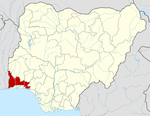 | |
| Towns and villages | ||
| Governors of Ogun State | |
|---|---|
| States of Nigeria | |
|---|---|
| Federal Capital Territory | |